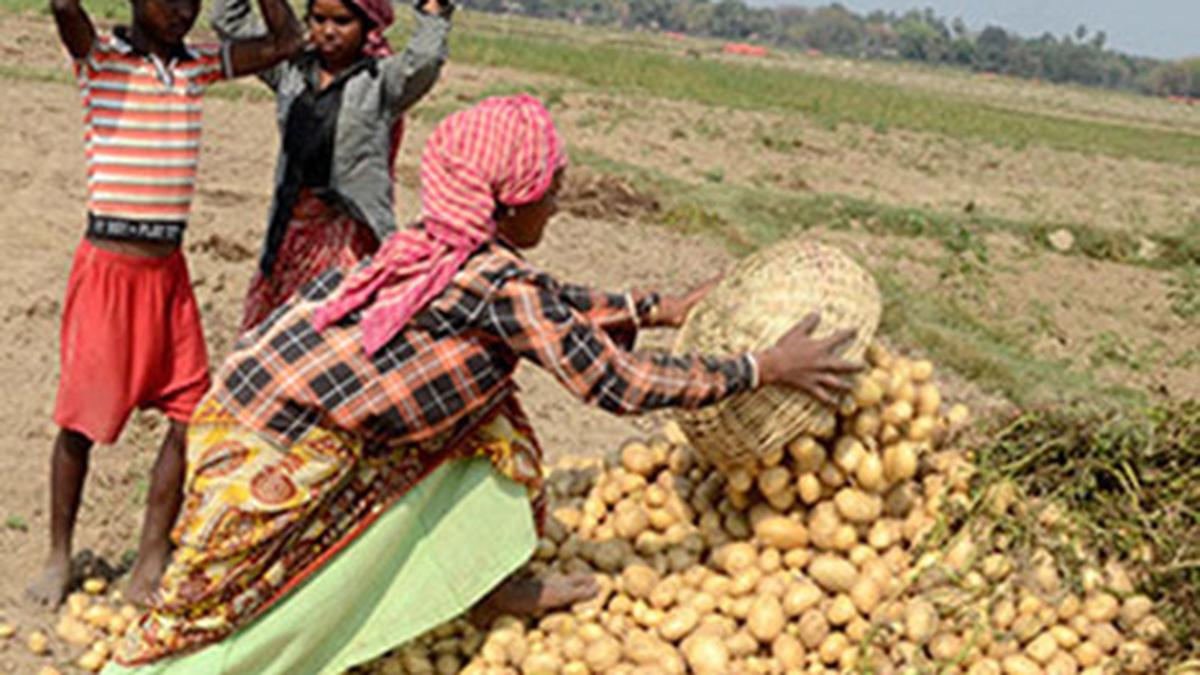Explained | What is the legal row between farmers and PepsiCo?

Farmers harvesting potatoes of the Atlanta variety in contract farming arrangement with PepsiCo India limited at Abhirampur village in Hooghly District.
| Photo Credit: SUSHANTA PATRONOBISH
The story so far: On July 5, the Delhi High Court held that there was “no merit” in the appeal filed by PepsiCo over the patent rights for its ‘unique potato’ variety. The appeal was against an order passed by the Protection of Plant Varieties and Farmers Rights’ Authority (PPVFRA), revoking PepsiCo’s registration vis-a-vis the unique potato variety developed by it.
What was the case about?
The PPVFRA revoked PepsiCo’s registration with respect to its potato plant variety, ‘FL 2027’ (used in Lay’s chips), on the grounds provided under Section 34 (grounds for revocation of registration) of the Protection of Plant Varieties and Farmers Rights Act, 2001 (PPV&FR). FL 2027 is a ‘chipping potato’ variety with low external defects, high dry matter/high solids content and stable sugars, all of which make it highly suitable for the manufacture of chips.
According to the appellant, it was developed in the U.S. by Robert W. Hoopes, a plant breeder and a former employee of Frito-Lay Agricultural Research, a division of PepsiCo Inc. A certificate of registration for FL 2027 was granted to PepsiCo India on February 1, 2016, conferring it an exclusionary right to market, sell, import, export or distribute FL 2027 for a period of six years. However, in an application filed by Kavitha Kurungati, a farmers’ rights activist, the PPVFRA revoked the company’s registered potato variety on December 3, 2021.
What is the PPV&FR Act?
The Act provides an effective framework to conserve and encourage the development of various plant varieties. It established an effective system to safeguard and recognise the rights of breeders, researchers and farmers to promote agricultural development in the country.
Additionally, it also facilitates the mushrooming of the Indian seed industry to ensure the availability of high-quality seeds and planting materials to farmers.
What are grounds for revocation?
According to Section 34 of the PPV&FR Act, the protection granted to a breeder may be revoked by the authority on the following grounds — that the grant of a registration certificate is based on incorrect information furnished by the applicant; that the registration certificate was granted to an ineligible person; when the breeder does not provide the registrar with the required documents; a failure to provide an alternative denomination for variety registration in case the earlier variety provided is not permissible for registration; a failure of the breeder to provide the required seeds for compulsory licence; failure to comply with the acts, rules, regulations and directions issued by the Authority; and if the grant of the registration certificate is against public interest.
Why did the court reject the appeal?
In relation to Section 34(a) (incorrect information furnished), it was discovered that PepsiCo had sought the registration of FL 2027 variety as a “new variant” instead of an “extant variant” in its application dated February 16, 2012, despite furnishing the date of its commercialisation in India to be December 17, 2009. However, to be registered as a “new variant” an additional requirement of ‘novelty’ in addition to ‘distinctiveness’, ‘uniformity’ and ‘stability’ must be satisfied one year before the date of filing of the application for registration. The court held that FL 2027 could not fulfil the criteria of novelty and was only eligible for registration under “extant variety”.
What next?
India is an agri-based economy with the agriculture sector having the highest workforce, nearly 152 million as of FY2021 as per Statista. Multinational food processing companies and investors must prioritise the well-being of farmers and their rights by developing a comprehensive understanding of India’s local laws, particularly the PPV&FR Act 2001, and recognise the safeguards and protections it provides to farmers.
Kartikey Singh reads law at the Rajiv Gandhi National University of Law
For all the latest business News Click Here

